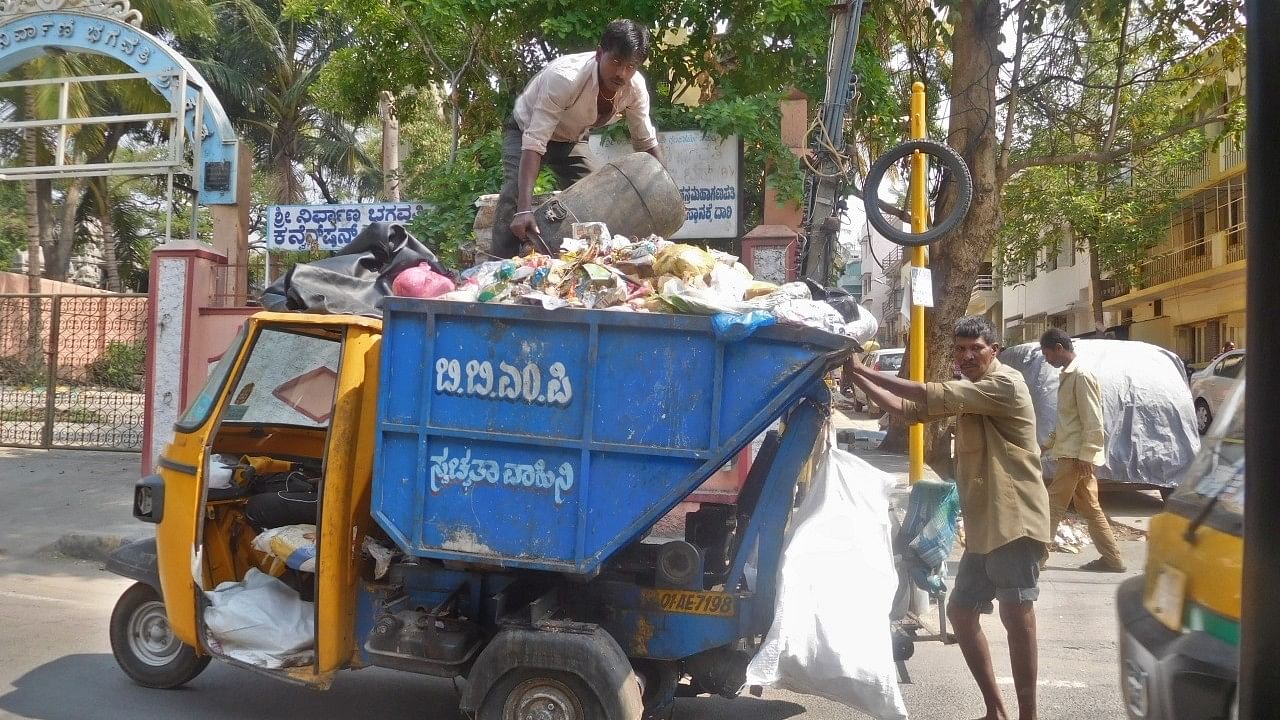
Most waste collectors don't use any safety gear.
Credit: DH Photo/Kathyayini Chamraj
Sanitation workers in Bengaluru encounter a variety of occupational health hazards; however, due to inadequate monitoring and accountability, these challenges remain unresolved despite years of protests.
While the BBMP has officially acknowledged the street sweeper community, comprising approximately 15,000 individuals, as pourakarmikas and included them in the direct payroll system, approximately 13,000 workers who are engaged in door-to-door waste collection continue to be under the contract system. Consequently, they experience inferior health status and poor insurance coverage.
Workers operating in garbage collection autos typically handle waste using their bare hands and also work amid unsegregated garbage.
Srinivasan, helper in a waste-collection auto, says he last received boots, gloves, and masks from his contractor a year ago.
“About two months ago, I got a new pair of gloves. This was after I protested and told the contractor and health inspector that I wouldn’t segregate waste without safety gear. I still don’t have boots and masks,” he says.
The last time BBMP had a written contract with garbage contractors was in 2018-2019, for only 105 of the total 198 wards. This contract stipulated that workers’ hand gloves should be replaced monthly, gum boots every six months, and so on – at a much higher frequency than is currently observed.
Since BBMP’s subsequent attempts to float tenders failed due to legal complications, the practice now involves issuing just supply orders to contractors. This leads to the omission of any specified frequency for the provision of safety gear, even on paper, as noted by Sandya Narayanan from the citizen collective Solid Waste Management Round Table (SWMRT).
Within some Dry Waste Collection Centres (DWCCs), which were established based on tripartite Memorandums of Understanding (MoUs) between the BBMP, the contractor, and a resource organization, safety gear inadequacies are also evident. At a DWCC in HMT Layout, Jalahalli, workers revealed that their gloves had deteriorated, and new replacements hadn’t been received for a span of four months.
S N Balasubramaniam, general secretary of the BBMP Garbage Contractors’ Association, maintains that contractors are not investing in safety gear as workers don’t wear these.
“Workers say these are uncomfortable for them,” he says.
Whereas an official at the BBMP SWM department says that sweepers, who are under the civic body’s direct payroll were last given four pairs of gloves for use over one and a half years.
Around 2019, several Solid Waste Management (SWM) practitioners within the city partnered with designers and presented designs for comfortable safety gear to the BBMP. This encompassed gloves akin to gardening gloves, as opposed to the frequently used rubber gloves. Regrettably, these initiatives were not progressed further.
Nalini Shekar, the executive director of the waste workers’ organization Hasiru Dala, states that they are presently engaged in designing safety gear themselves, tailored to the specific needs of the workers within their Dry Waste Collection Centres (DWCCs).
“Safety gear that is specific to waste workers is not available in the market. Moreover, the gear that’s suited for one type of waste-related work is not suitable for another.”
Gaps in ESI coverage
All waste workers, including contract workers, are supposed to be covered by Employees’ State Insurance (ESI).
However, Maitreyi Krishnan of the All India Central Council of Trade Unions (AICCTU) notes that several contract workers don’t possess ESI cards. She recalls a recent incident involving a contract worker who developed a heart problem during work and had to incur Rs 1.5 lakh in expenses at a private hospital.
“Many contract workers don’t get wage slips, so it’s unclear if their ESI contributions are paid. Even if it is paid, many don’t know their ESI card or number,” she says.
“A study by the National Institute of Urban Affairs (NIUA) among pourakarmikas across five cities had shown their lack of awareness about ESI utilisation. Currently, workers just get a brochure about this, but many can’t even read,” says Shekar, who worked with NIUA to develop a training programme on ESI utilisation for pourakarmikas.
Doctors who interact with waste workers observe that they usually visit private clinics for minor ailments and resort to ESI hospitals only for major treatments. This is often due to the considerable distance to ESI hospitals.
An official at Bengaluru Solid Waste Management Ltd said that data pertaining to workers’ ESI cards and utilisation is maintained at the zonal level, and the BBMP lacks consolidated data on this matter.
Health concerns
Dr Akshatha of Hasiru Dala who attends to waste workers said that musculoskeletal issues respiratory problems urinary tract infections skin conditions and gastroenteritis are prevalent among them. A 2019 study conducted by the Tata Institute of Social Sciences among 100 waste workers in two BBMP wards revealed that 46 per cent were afflicted with chronic diseases such as hypertension arthritis asthma diabetes and anaemia. An astonishing 88 per cent experienced recurring illnesses like musculoskeletal problems headaches eye irritation and breathing difficulties. Additionally one-third of workers encountered work-related injuries. Surprisingly despite their health concerns over 60 per cent of workers showed a preference for private health facilities over public ones. Furthermore almost three-fourths refrained from taking any leave of absence even when unwell due to the fear of losing their pay.